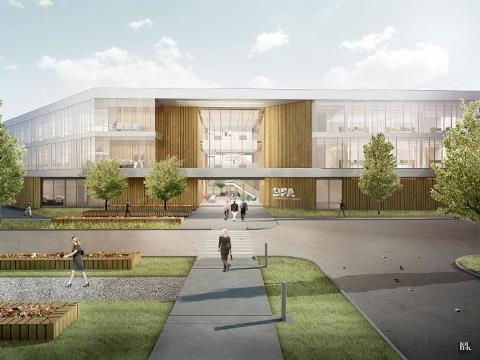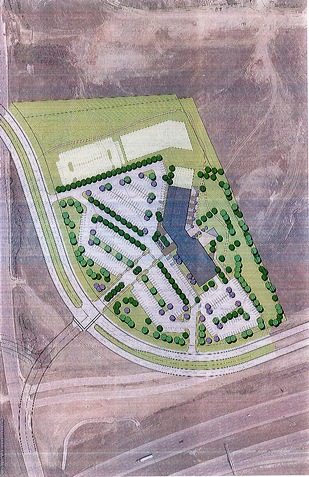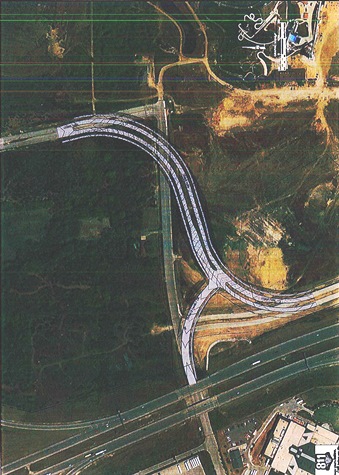
A Unified Government committee tonight approved a mix of financing for the new $30 million Dairy Farmers of America office building.
DFA will move its headquarters building from near the airport in Kansas City, Mo., to 12 acres near the Schlitterbahn area in Kansas City, Kan. DFA is buying the land from SVV, Schlitterbahn Vacation Village. The DFA has about 300 employees at its headquarters making an average of more than $90,000 a year, according to officials.
Although many of these employees will not necessarily be moving their homes to Wyandotte County since their headquarters is already in the Kansas City area, apparently UG officials are banking on their “buying power” to support sales at The Legends Outlets and nearby businesses, and boost the sales taxes to the UG.
The DFA project now advances to the Unified Government Commission level. A public hearing on it is expected to be Feb. 26.
Doug Bach, UG administrator, said he was very pleased that the DFA board chose the proposed site here. The proposal was put together by the state of Kansas, the UG and Schlitterbahn.
Bach said nothing in the project would change the base of the STAR bonds, which are still projected to be paid off in 2016.
The $30 million cost of the project includes $20 million for the purchase price of the land and to build the 100,000-square-foot building, and $10 million for the purchase price of equipment, according to UG officials.
George Brajkovic, UG director of economic development, said the UG incentives to be offered include industrial revenue bonds with a 75 percent tax abatement for a 10-year payment in lieu of taxes term.
About $1 million from the sales tax revenue (STAR) bond issuance for eligible site preparation costs will be offered, Brajkovic said. This site is part of an existing STAR bond district and is eligible for this, he said.
The 75 percent tax abatement includes the standard tax abatement of 45 percent, added to that is a 15 percent abatement for quality office, 10 percent capital investment and 5 percent for local, minority and women construction and professional services, Brajkovic said.
The development agreement calls for DFA to pay fixed PILOT payments for the first three years, with an increase of $5,000 per year after that, until the end of the IRB term.
IRBs with a 75 percent tax abatement also can be used to finance another building, an Innovation Center, as well as expansion improvements, according to the agreement. The agreement contains an option to expand the office by 50,000 square feet and an option to build an Innovation Center at 50,000 square feet.
The PILOT savings to DFA over the 10-year term will be about $5.5 million, Brajkovic said, and there may be a sales tax exemption on construction materials from the Kansas Department of Revenue.
Brajkovic said the project will require the UG to do roadwork for an “S” curve on 98th Street between Parallel and State Avenue, near the France Family Drive. This design was part of the original Schlitterbahn agreement, he said.
The cost of the “S” curve road improvements on 98th Street will be about $4.5 million, he said, and the UG is proposing issuing temporary notes for the start of it. The long-term funding sources are STAR bond proceeds, the state of Kansas, and Schlitterbahn, he said. The “S” curve improvements would be completed by Dec. 31, 2015, or by July 2016, according to the current timetable.
Brajkovic said the current tax revenues from the land are about $40,000 a year. The payments the UG would receive in the first year for the headquarters building would be about $135,000, and by year 10, about $170,000, he said.
“The additional value from the PILOT during the term back to all the taxing jurisdictions is just shy of $1.5 million,” Brajkovic said.
UG researchers estimated another $150,000 in sales taxes generated by the employees who work at the DFA, who may shop at The Legends or nearby retail businesses.
Mark Korsmeyer, executive vice president of the DFA, said the company was excited to locate in Kansas City, Kan.
Joel Clark, senior vice president of accounting for DFA, said the 100,000-square-foot building has a lot of glass in the exterior design and would bring in a lot of natural light.
He said they have been working on this for 18 months and looked at a lot of alternative sites. The cooperative is organized in the state of Kansas, he said. The DFA’s current building was constructed in the 1980s, he added.
“Our roots are originally in Kansas, in terms of organization, and we are committed to the Kansas City metropolitan area,” Clark said. There are employees who live on both sides of the state line, he added.
“This area offers the amenities that our employees of today and tomorrow are really seeking,” said Monica Massey, senior vice president of corporate affairs at DFA. “We are excited to be in the area and building a state-of-the-art global headquarters for them.”
UG Commissioner Mike Kane asked DFA executives to contact the Wyandotte County school districts and let them known what requirements the company has for applicants for jobs. He also invited DFA employees to move into Wyandotte County.
Clark said there were 308 employees at the headquarters building today, and the employment projection by the time the building is completed, is 330 employees. The target completion date is Nov. 1, 2016, and the executive summary says the headquarters building must be completed by April 1, 2017.
The UG earlier presented information stating that the jobs were averaging $90,000 a year and better for a base average wage.


